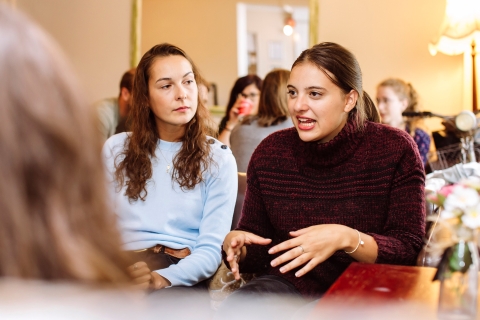

Understand more about what healthy and unhealthy relationships look like at university
You'll meet lots of new people when you come to university. You'll make friends and build relationships with people from all around the world.
Making new friends is part of what makes uni great. Healthy relationships and friendships help you enjoy all aspects of uni life, and help you to get the most from your studies too.
Your friendship group can help you settle into a new way of life, keep you happy and successful, and act as a support network while you're at uni.
Everyone's different – and we all want different things from a friendship or relationship – but there are some common things to look for and work on so you can build happy, healthy relationships at uni.
Building healthy relationships
Everyone you meet will have their own ideas of what a good friendship or a romantic relationship looks like.
Some people might be more comfortable with sharing parts of their lives sooner than others, or need reassurance of your kindness and care. It's important to find out what somebody you care about is looking for.
Whether it's a friendship or partner, some good habits for healthy relationship building include:
- Communicating well – listening and acknowledging each other's feelings
- Having a foundation of honesty and trust
- Knowing boundaries and accepting differences
- Accepting that disagreements can happen, but it's important to be fair
- Not overriding others' opinions
- Showing mutual respect and support for one another
- Celebrating achievements and positives together
- Supporting each other through challenges and difficult times
- Putting the effort into each other, it won't always be easy
You and your partner
Going out on a date or being in a relationship can be an exciting and fun experience. Meeting someone you really like and building a close relationship with them can be a really fulfilling experience.
Relationships might seem a bit tricky at first because everyone is different and so is every relationship. But while the finer details will be unique to you and your partner, there are some general things you should look for in any healthy romantic relationship:
- Feeling safe and completely free to be yourself
- Making quality time with your partner over shared interests
- Demonstrating self-love as well as love for your partner
- Showing interest in each other's lives
- Communicating your wants, needs and desires in a supportive way
- Accepting each other's differences, quirks and habits – you don't need to be the same person
- Sharing positive feelings and showing affection not just through sexual intimacy
- Supporting each other through personal growth and reaching goals
- Understanding and talking about how you'll both change as you grow together, it's not about how your relationship starts but how it evolves
- Taking time out to do your own thing – it's important to have your own space
- Knowing that you're part of a team – if there's a problem you should solve it by working together
Unhealthy signs
How do you know if your relationship is unhealthy?
Every relationship will come into some bumps and challenges along the way, it's normal. But it's what those bumps look like and how you work together to solve them that matters. What a good relationship looks like is different for everyone, but it's important to know some common signs that you might be in an unhealthy relationship.
Respect
Your partner should always give you the respect you deserve.
They aren't showing you respect if they:
- Don't accept your boundaries and ignore your needs
- Don't consider your perspective or listen to you when you say no
- Consistently break promises and your trust and keep saying they'll do better next time
- Continually ask for forgiveness rather than ask for your permission
- Don't acknowledge your feelings and minimise or deny you should feel the way you do about something
How to disagree
Facing challenges, disagreeing or arguing about something is pretty common in most relationships. If both of you aren't approaching the problem in good faith then the problem can get worse and spill over into other areas.
Some unhealthy signs that you should keep an eye out for include:
- You have really high highs and really low lows – your relationship feels like an emotional rollercoaster
- You argue constantly and clash over seemingly trivial issues
- Rather than listening and accepting each other's feelings so you can fix the problem, the argument is just dropped and not resolved
- Your partner gives you half-hearted apologies like "I'm sorry you feel that way" rather than being genuinely sorry for their actions
- Your partner finding one-sided solutions to problems, which favour them
A step too far
Everyone loves a bit of banter – it's a sign of a healthy relationship. Pushing each other's buttons might make for a good laugh, but it's important to know the difference between playful teasing and genuinely hurtful behaviour.
You should talk to your partner about how they might be saying hurtful things when:
- They put you down when they know it hurts you
- They make an effort to demean or embarrass you in public
- You find yourself justifying your partner's bad behaviour to others
Controlling behaviour
While wanting lots of love, affection and attention isn't a problem in a relationship, there are healthy ways of expressing those feelings.
Unfortunately sometimes a partner might express what they believe is affection through controlling behaviours. It's important to know what controlling behaviour looks like – it could be that they make you feel a little uncomfortable, or even that they make you feel unsafe.
Controlling behaviour from your partner looks like:
- Getting jealous when you get attention from other people
- Not trusting you and invading your privacy, like demanding to read through your messages or social media
- Being very possessive and demanding all your time
- Isolating you from your friends so you form a stronger attachment to them
- Being vindictive, like picking over past events to attack or emotionally blackmail you
- Telling you what you can and can't do, who you can see or what you can wear
- Being unwilling to compromise when they express their feelings
- Threatening to harm you or themselves if you leave or they don't get their way
- Using physical, sexual or emotional abuse against you in any way
Addressing relationship problems
If you find unhealthy signs early on it's best to let your partner know so you can work on those things together.
You can also speak with your close friends about how you're feeling. They can offer a different perspective and share how they've dealt with similar challenges.
If your partner isn't willing to work with you on those problems, or they don't actively show they're working on them then you might need to consider separating. If it's a problem that makes you extremely uncomfortable or unsafe you should consider your options to safely end the relationship.
You might look to friends and family for help so that no one is harmed. Or you can look to external or university support services to get help and stay safe. National support services you can go to include:
- Relate – the UK's largest provider of relationship support
- Refuge – national charity providing support for domestic violence victims
- Samaritans – offering support for anyone experiencing emotional distress
Most universities will have wellbeing services you can go to for help. They'll have staff who work with students and young people regularly including wellbeing advisers, counsellors and mental health advisers.
If you're looking for support services in Portsmouth, you can contact Student Wellbeing or the Students' Union Advice Service.
Other kinds of relationships
Coming to uni also means you'll develop other relationships, or old ones might change. Each will come with its own positives and challenges.
If you're housing-sharing, you'll have housemates – including some you might not know. You should sit down together to sort out things like house responsibilities, and how and when bills are paid so you're all on the same page.
Your newfound independence at uni will be refreshing, and with so much on you're probably going to contact your parents less. But it's important to check in with them every now and again, because they'll want to know how you're doing.
If you find your family are calling or getting in touch when it's hard for you to chat – maybe you're on a night out, or just heading into a lecture – consider scheduling in times where you can catch up more easily.
If you've moved to a new town for uni, you're probably further away from the friends you've spent your schooling with.
You should talk them about how things might change; chances are you won't be able to be as tight knit as you used to be, but that doesn't mean your friendship is over. You can stay in touch with video calls and catch ups and you can always hang out if you head home during the holidays.
More resources
Making friends and meeting people
Discover the many ways you can meet and get to know new friends at university, and how to get out and about in the city and build a community.

Safe sexual relationships at uni
Understand more about positive, healthy, consensual sex before moving away from home and starting university.

Enable University alerts
Turn on notifications for critical updates like closures, safety alerts, and urgent service disruptions.





